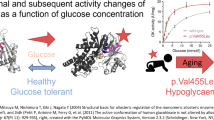Abstract
The etiology of non-insulin-dependent diabetes mellitus (NIDDM) is usually explained as a combination of peripheral insulin resistance and impaired beta-cell function. Phosphofructo-1-kinase (PFK1) is a rate limiting enzyme in glycolysis, and its muscle subtype (PFK1-M) deficiency leads to an autosomal recessively inherited disorder known as glycogenosis type VII or Tarui’s disease. It was evaluated whether PFK1-M deficiency leads to NIDDM in humans.
A core family of four was evaluated for PFK1-M deficiency by DNA- and enzyme-activity-analyses. All members underwent oral and intravenous glucose tolerance test (oGTT/ivgtt), as well as an insulin sensitivity test (IST) using octreotide.
Results: Father (46 years, BMI 22.4 kg/m2) and older son (19 years, BMI 17.8 kg/m5) showed homozygous PFK1-M deficiency, while mother (47 years, BMI 28.4 kg/m5) and younger son (13 years, BMI 16.5 kg/m5) were shown to be heterozygously PFK1-M-deficient on enzyme activity levels. DNA analysis revealed an exon 5-missense-mutation at one allele of all four members, and an exon 22-frameshift-mutation at the other allele of the two homozygously affected individuals. By oGTT the father showed impaired glucose tolerance, and the mother clinical diabetes. By ivGTT both parents and the older son had a decreased first phase insulin secretion, and a diminished glucose disappearance rate. The IST showed marked insulin resistance in both parents and the older son, and moderate resistance in the younger son, previously not described.
Conclusion: PFK1-M-deficiency leads to a metabolic state typical for early NIDDM in homozygously affected humans, especially concerning insulin resistance and loss of first phase beta-cell insulin secretion, and may contribute to the manifestation of NIDDM in a subgroup of patients.
Similar content being viewed by others
Author information
Authors and Affiliations
Rights and permissions
About this article
Cite this article
Ristow, M., Vorgerd, M., Möhlig, M. et al. Insulin resistance and impaired insulin secretion due to phosphofructo-1-kinase-deficiency in humans. J Mol Med 77, 96–103 (1999). https://doi.org/10.1007/s001090050311
Issue Date:
DOI: https://doi.org/10.1007/s001090050311




